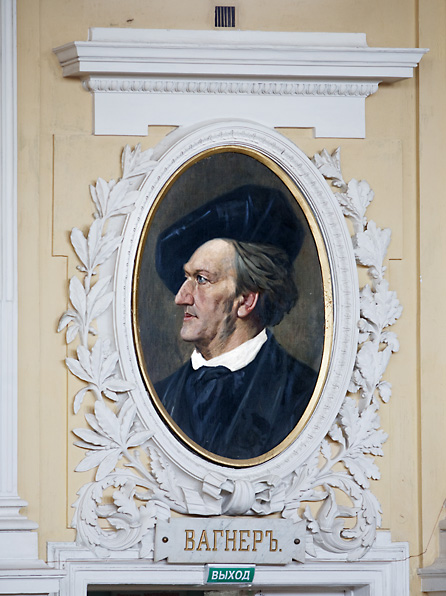

Richard Wagner (1813–1883) was a German composer, conductor, playwright and writer on music. He was brought up in an artistic family and was fascinated with theater from an early age. In 1834–1839 he was Kapellmeister in the opera theaters of Magdeburg, Königsberg and Riga. In 1839–1842 he lived in Paris, where he made the acquaintance of Hector Berlioz, Franz Liszt and Giacomo Meyerbeer, who exerted a considerable amount of influence on him. The operas “Rienzi” and “The Flying Dutchman,” written by the composer in 1840-1841, demonstrate his fascination with Romantic opera.
The formation of the composer’s worldview took place under the impact of the social and political developments which were taking place in Europe in the 1830s and 1840s. In 1843 Wagner became the conductor of the Court Opera in Dresden. In his operas “Tannhäuser” and “Lohengrin” the romantic themes and images achieved a generalized ethical aspect. These compositions became an important stage in the composer’s development towards the reform of opera which he conceived. He wrote the texts to his operatic works himself, disclosed the technique of the leitmotif and added a symphonic dimension to the musical texture of his scores. After taking part in the Dresden uprising in 1849, the composer was declared to be a state criminal.
During the period of his “exile in Switzerland” (1849–1858), Wagner wrote his main literary treatises. In 1859-1863 he made a number of tours throughout Europe (visiting Great Britain, France, Germany and Russia). In 1864 the composer lived in Munich, where he enjoyed the patronage of Bavarian king Ludwig II.
In 1865 Wagner settled in Switzerland once again, and in 1872-1882 he lived in Bayreuth. There upon his initiative the Bayreuth Theater was built, where the productions of his performances took place.
In his literary treatises “Art and Revolution,” “Artwork of the Future,” “Opera and Drama” and “A Communication to My Friends” Wagner formulated the basic positions of his operatic reforms.
The music of Wagner exerted a strong influence on the composers of the following generation: Anton Bruckner, Hugo Wolf, Gustav Mahler and Richard Strauss, and on the subsequent development of European musical culture.
Among his compositions are operas, such as “Rienzi,” “The Flying Dutchman,” “Tannhäuser,” “Lohengrin,” “Tristan and Isolde,” “Der Meistersinger von Nuremburg,” “Der Ring des Nibelungen” (a tetralogy of operas) and “Parsifal;” works for orchestra, including symphonies, overtures, marches; works for piano and vocal works.